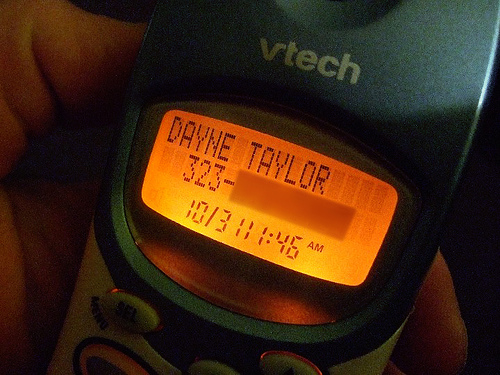
Taylor Dane? Singer of the 1987 smash hit "Tell It To My Heart"? You'd better not be spoofing me! Photo by bochalla
Under new rules adopted by the Federal Communications Commission (FCC) yesterday, US consumers have acquired further protections against scam artists and other ne’er-do-wells who deliberately seek to defraud, cause harm, or wrongfully obtain anything of value from them.
In response to the growing number of nefarious Caller ID spoofing schemes, Congress passed the Truth in Caller ID Act which also required the FCC to establish additional rules related to its implementation.
In accordance with the FCC’s new rules:
- Violators are subject to up to $10,000 for each violation, or three times that amount for each day of continuing violation, to a maximum of $1 million for any continuing violation
- The FCC may assess fines against entities it does not traditionally regulate without first issuing a citation
- The FCC can impose penalties more readily than it can under other provisions of the Communications Act
To sum up: fines up to $1M (big money & big whammies), extended enforcement powers without advance warning (i.e. you know that neighbor kid that you’ve always wanted to put into Time Out?), and swifter imposition of fines (easy-peasy-lemon-squeezy penalties).
The mechanisms for caller ID spoofing available to those who would violate the Act are numerous and cheap. An Internet connection, three bucks, and a French fry are pretty much all one needs to access the technology required to mask caller ID information for deceptive purposes. Once obtained, scammers can, for example, make a call requesting bank account information from a consumer about a phony, unpaid water and sanitation bill appear on caller ID to have originated from that consumer’s (actual) local water company.
One are of concern for the ARM industry is how the use of apparently legal caller ID masking might be interpreted by the judicial system. A collection agency that altered caller ID information to display a local number (to improve the likelihood that a person will pick up the phone) on a consumer’s caller ID gizmo, for example, would not violate the Act. However, the courts might interpret that strategy as a “scheme to wrongfully obtain something of value,” in which case it would violate the Act. Moreover, the ARM industry as a whole could face collateral public relations damage from any press that might surround an illegal “debt collection” scam.
On June 22, 2011, the FCC also issued a report to Congress on the matter, Caller Identification Information in Successor or Replacement Technologies, and may be asked to address similar concerns about spoofing practices among emerging communication methods such as social media platforms and text (SMS) messaging.
The FCC is encouraging consumers to let the Commission know about ID spoofers by calling 1-888-CALL-FCC or sharing individual experiences on the FCC blog.
Michael Klozotsky is the managing editor of insideARM.com. He is also a huge fan of the classic Bart and Lisa Simpson phone prank: “Uh, Jacques Strap! Hey guys, I’m looking for a Jacques Strap!” He does not, however, condone caller ID spoofing or any other illegal scams.




![the word regulation in a stylized dictionary [Image by creator from ]](/media/images/Credit_Report_Disputes.max-80x80.png)
![Cover image for New Agent Onboarding Manuals resource [Image by creator from insideARM]](/media/images/New_Agent_Onboarding_Manuals.max-80x80_3iYA1XV.png)


![[Image by creator from ]](/media/images/New_site_WPWebinar_covers_800_x_800_px.max-80x80.png)
![[Image by creator from ]](/media/images/Finvi_Tech_Trends_Whitepaper.max-80x80.png)
![[Image by creator from ]](/media/images/Collections_Staffing_Full_Cover_Thumbnail.max-80x80.jpg)
![Report cover reads One Conversation Multiple Channels AI-powered Multichannel Outreach from Skit.ai [Image by creator from ]](/media/images/Skit.ai_Landing_Page__Whitepaper_.max-80x80.png)
![Report cover reads Bad Debt Rising New ebook Finvi [Image by creator from ]](/media/images/Finvi_Bad_Debt_Rising_WP.max-80x80.png)
![Report cover reads Seizing the Opportunity in Uncertain Times: The Third-Party Collections Industry in 2023 by TransUnion, prepared by datos insights [Image by creator from ]](/media/images/TU_Survey_Report_12-23_Cover.max-80x80.png)
![Webinar graphic reads RA Compliance Corner - Managing the Mental Strain of Compliance 12-4-24 2pm ET [Image by creator from ]](/media/images/12.4.24_RA_Webinar_Landing_Page.max-80x80.png)